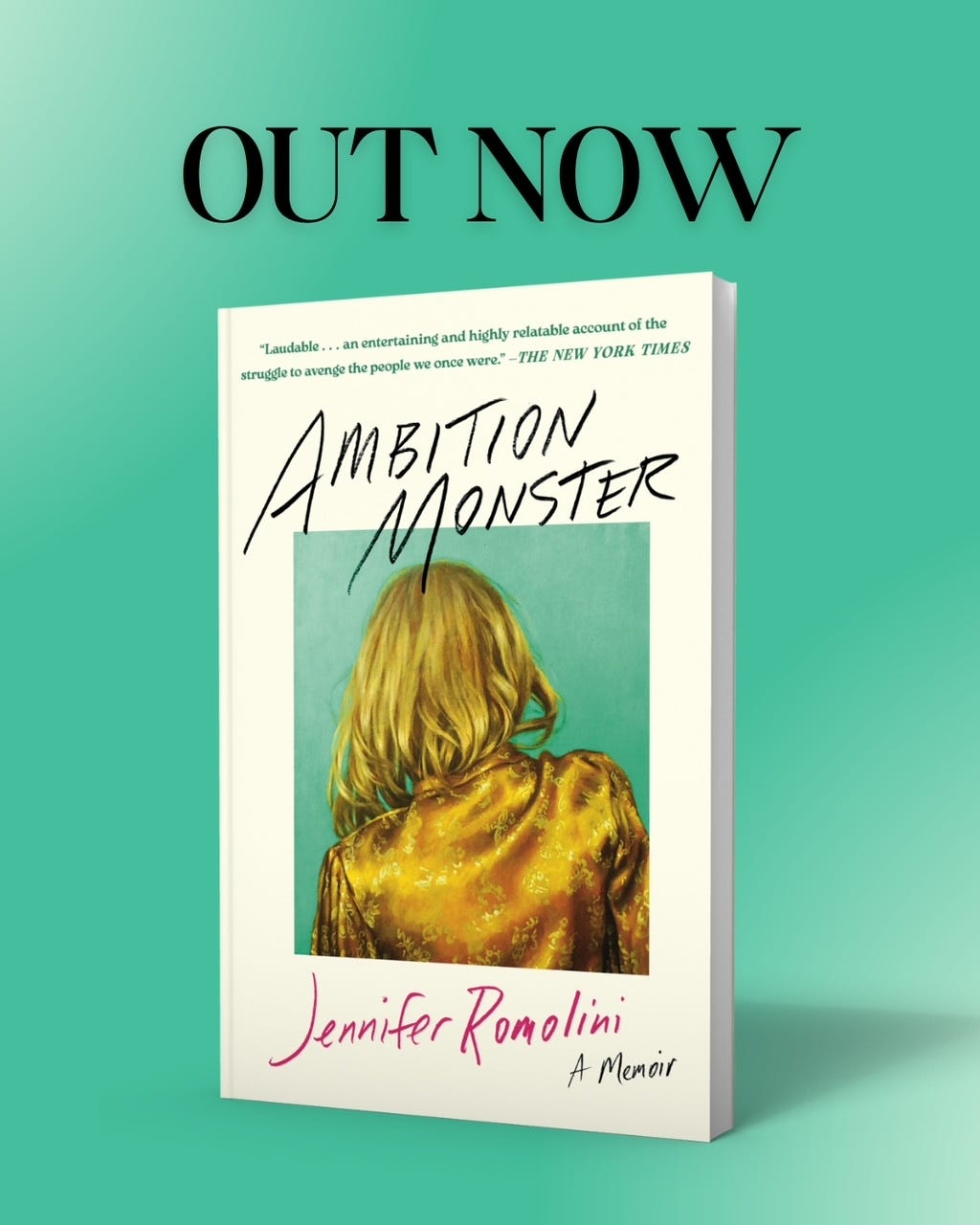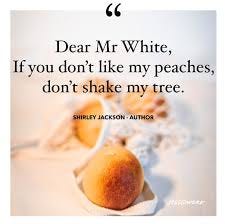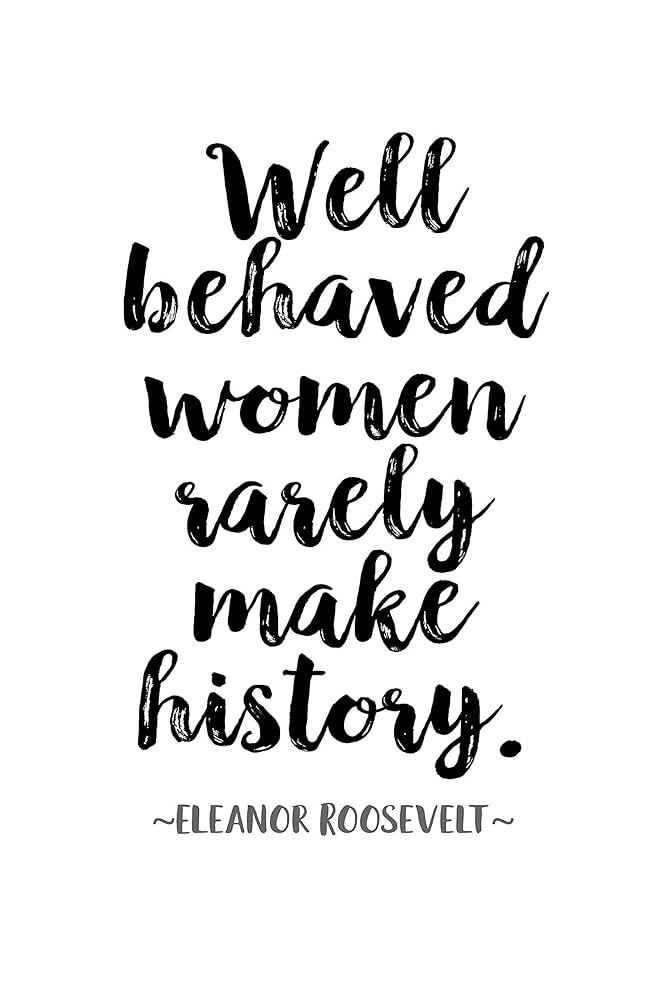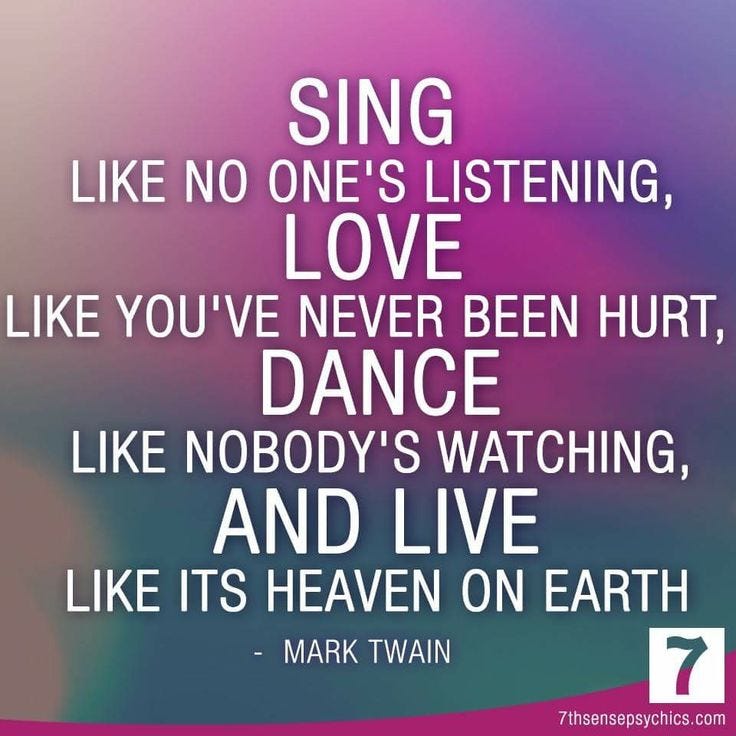Programming note: the Ambition Monster paperback is out today! Which means there’s now a cheaper, softer and — let’s be honest — better and cooler version to gift to all your work-stressed friends! To commemorate the occasion, I’m releasing a few deleted chapters/scenes from the original manuscript, which may or may not suck, I honestly can’t tell. The experience of time is strange for everyone, but maybe especially artists and writers. These words already feel trapped in another era, I for sure wouldn’t write them the same way today.
In any case, thanks to everyone who supported this work over the last year. More to come. x
I’m in the business of quotes. All writers and editors are. As a reporter, you become hyper-attuned to listening for and steering toward the good ones, the moment in an otherwise drab conversation when the subject recalls the one detail you need to bear out your story, spurts out a combination of words so ideal you hadn’t imagined they’d say them, a flawless turn of phrase you would not have thought to write. Good quotes leap off a transcript, they read different. They’re always a gift, an energetic exchange between interviewee and interviewer, a moment of truth or what sounds best as truth, a mind meld, if only brief.
I have a screenwriter friend who trades exclusively in quotes, who tracks real-time conversation like it’s on-page dialogue, who unconsciously mouths the last words of my sentences before I’ve spoken them, predicts verbalized thoughts before they’re formed. There’s a pattern to such things, if you study and think about it enough, a code.
I know a novelist who sits and eavesdrops in places where her fictional characters would potentially gather, jots down conversations she hears, uses them verbatim in her books. The quotes are right there, out in ether, fair game for anyone’s use.
I once worked for a magazine editor who punched up everyone’s quotes, tightened thoughts and ideas, replaced overused adjectives with lesser-used ones, generic nouns for those more inspired. I was her fact checker, when I worried the quotes were no longer accurate, she’d correct me: “No one gets mad when you make them sound smart.”
In my business, which used to be many things, but is now mainly quotes, there are excerpts and captions, shortened strings of sentences meant to sell longer strings. The “pull quotes” editors tug out of lengthy web stories; those they cut and paste into white boxes, a design feature tucked into the architecture of the page, used to give rest to the eye, to tease paragraphs to come.
“No one gets mad when you make them sound smart.”
Google hates a block of text, the SEO experts will tell you, can you turn this essay into a bulleted list? If not that, pull out more quotes, massage them ever-so-slightly with search-friendly keywords, turn those words bold, this’ll help future Googlers find a writer’s work, bring more clicks to your site, more eyes on your ads. This is called long-tail traffic strategy. This is how you’ll succeed.
Did you know the most clickable color on the internet is blue? Do you know the most-clicked words are “avoid,” “budget,” and “best?” I become a digital-media consultant, these are the questions I pose. I wear silk blouses over jeans and under blazers, run up into offices with my slide presentations, a door-to-door salesman, a huckster hawking my web 2.0 wares. Inside I meet hopeful founders of doomed websites and try not to dash their hopes.
I tell clients about WIIFM —What’s In It For Me?— the number one reason readers, followers, and users read, follow, use. I flip through serious-but-not-too-serious Power Points which explain how to grow a brand. You need super users and you need to super serve them, you need brand tourists too. Who’s your ideal consumer? What makes them click and comment, like, engage? How do you get them to your site? Is your content “sticky”? Will it keep them stuck there?
My presentations include user-habit maps, deep-dive forensics, memes, best-practice tips. I charge by the hour, I charge by the month. I am telling the truth about the state of the internet, how to best win the game. But it’s ethically slippery work. The truth is shifting by the day. My projects end before the reality sets in, before I’m accountable for every change.
A fellow consultant wants to meet for lunch. We’re working two sides of the same project for a legacy media company with deep pockets, a company bought and sold so many times neither of us is sure of its current name. The consultant’s name is Ann. She’s in her mid-50s, wears a bright fuchsia jacket and Gucci loafers, her short silver hair styled in an architectural plume. Ann is a former Fortune-500 executive, now sought-after consultant; fast-talking, firm, and confident in a way that telegraphs she knows her shit. She wants to take me under her wing. I’m doing this all wrong.
She shows me her fluffed-up proposal for our project, slide after slide packed with corporate jargon and forecasting charts, lines all going up and to the right. The strategy’s a word salad, the kind of arbitrary directional change I hated when I worked inside, a strategy I know from experience is unlikely to succeed, one likely to hurt people and jobs before it fails.
“The more expensive you are, the more they respect you,” she says. I squawk about dubious ethics, stealing money, how this fiscal exchange feels wrong, “Stop feeling! They’re never going to care about you, stop caring about them.”
“Listen, these companies are not looking for a real solution, they’re post-solution,” Ann explains. “They want a direction to march in so they can tell someone higher up they’re marching, that’s all you’re here to provide.” She shows me how she sets her fees, how she takes her old salary, calculates what she needs to earn that much by the day. It’s thousands more than I am charging, more than I’d conceived possible to charge. “The more expensive you are, the more they respect you,” she says. I squawk about dubious ethics, stealing money, how this fiscal exchange feels wrong, “Stop feeling! They’re never going to care about you, stop caring about them.”
The best quotes pack a punch of feeling, a burst of words that somehow manage to make us feel seen. Human lives are lonely, mundane; we crave the sensory rush of strong emotion, evoke enough consistent anger and outrage, or alternatively (but not as reliably), joy and delight, and the user/reader/follower keeps coming back for more.
Think of Instagram ads as a grocery-store check-out line, I tell clients, they didn’t come here for your content, it’s bonus, like gum, you have seconds to catch an eye, to hook a swipe. How does your content play on TikTok? You need to show more behind-the-scenes. No one cares about your cocktail pics. Hashtags are useless. I don’t know how to pronounce GIF either, but I’m sorry, GIFs are too old. You want to seem aspirational but accessible, there’s a sweet spot there, one we can find. Your brand needs more cohesion. Do you know the correct posting cadence for each platform? Are you posting at the correct times? Social media is a monster that requires constant feeding. There’s an art to choosing the fewest words to elicit the most clicks and swipes, to uncover the irresistible text within the text, text which leaves a reader with little choice but to engage. I can teach you.
The social media accounts of some businesses I work with are comprised entirely of inspirational quotes, brands repurposing someone else’s words from some other place to sell their unrelated podcasts, hipster cookware, coffee alternatives, earth-friendly pants. Social media editors place the quotes on bright backgrounds in handsome-but-eye-catching fonts, a social “asset,” a thing made on a second-rate Photoshop platform because the boss was too cheap to pay for the real thing.
Many quotes are attributed wrong, if they’re attributed at all. You’ll wait months for deceased-writer Shirley Jackson’s birthday (news peg!) to post that viral Shirley Jackson letter, the one about “if you don’t like my peaches, don’t shake my tree,” the one that always performs, even if you’ve never verified that it’s real. Remember the quote your high school counselor had on that quote-a-day calendar? The one about our deepest fears, the one that Mother Teresa was supposed to have said, the one that slays on Facebook to this day? It’s really by Marianne Williamson. Eleanor Roosevelt never declared “Well-behaved women rarely make history,” that was historian Laurel Thatcher Ulrich, even if Instagram and a coaster at your great-aunt’s house suggest otherwise. George Washington may have chopped down a cherry tree, but he never talked about lies.
When I worked at the startup, a widely-shared inspirational quote was often attributed to my famous celebrity boss, even though it was never something she said. The internet turned the quote into Pinterest-ready placards, a backdrop for design-y clocks, splashed it across tight-fitting lady tees. The quote was the kind lifted most often from women’s mag interviews; just the generic/inspiring/badass parts, often made more generic/inspiring/badass outside of the context in which they were originally said.
In my first days on the job, I’d asked for access to the startup’s main email account. The inbox, which had been neglected for months, contained hundreds of messages. I spotted one young woman’s name more than a dozen times. She claimed she was the author of the quote attributed to my famous boss, said she had proof; claimed the whole situation caused her daily emotional trauma, dismay. When no one responded to her many queries, the woman’s mother also wrote in, pleading, this whole quote mess had left her daughter in bad shape. The emails grew more dire. Legal action threatened, though I doubted she’d have a case.
I resolved the quote situation swiftly — unlike most everything else at the job, it wasn’t hard to fix. I published a correction on the site and posted on my boss’s socials, ghostwritten by me in my boss’s voice. I assigned the woman a story about her experience—what’s it like to have your words given over to someone famous, for years? — paid her, promoted her story, gave her back her voice. The quote is still out there attached to the wrong person’s name, we solved nothing. The young writer just wanted acknowledgement, to be listened to and heard.
Misattributing inspirational quotes is nothing new — for centuries, possibly more, we’ve required that our wisest, most resonate words arrive from lofty places, not from some schmo we don’t know. Moses stole half those Bible quotes, right? Who’s the ghostwriter for God?
My favorite misattributed quote is the 90s-refrigerator-magnet classic: “You have to dance like there’s nobody watching, Love like you’ll never be hurt, Sing like there’s nobody listening, And live like it’s heaven on earth.” This quote is most often credited to Mark Twain, a man who died in 1910. But its actual source is from the songwriters Susanna Clark and Richard Leigh in their 1989 country song “Come From the Heart”:
You’ve got to sing like you don’t need the money,
You’ve got to love like you’ll never get hurt,
You’ve got to dance like there’s nobody watching,
You’ve got to come from the heart if you want it to work.
In the past few decades, someone added the “heaven” part to Clark and Leigh’s lyrics. Someone at Yale studied the origins and still no one knows who.








Love this, especially as someone who has a misattributed quote tattooed on my arm. Lol.
This resonated. Brought back all of my memories of how good I used to be at throwing in this kind of thing when being interviewed ("You just have to go for it" "Everything has to be done for the first time by someone" "I find that moms just know how to get things done"). It made publications so happy to have a pull quote and regular people so happy to have something to put in quotes when they posted but it was just a bunch of gibberish.
I loved this book, every chapter hit!
My favorite real (I hope!) Eleanor Roosevelt quote: Never allow a person to tell you no who doesn't have the power to say yes.